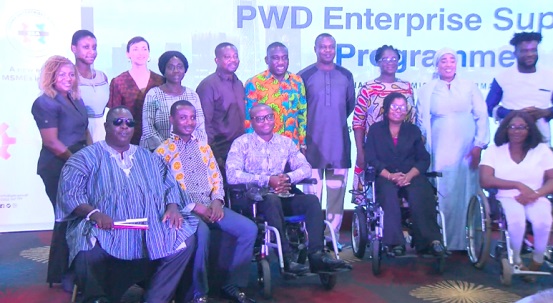The government has launched a GH¢12 million enterprise support programme for persons with disability (PWDs) in the country.
The PWD Enterprise Support Programme seeks to offer technical assistance and grant funding initiatives exclusively to 150 enterprises owned by PWDs.
The proposed special window is expected to promote the welfare of the enterprises owned by PWDs through business and financial management training and grant funding.
It is targeting PWD enterprises in agriculture/agro-processing, construction, education, food and beverages, health care or pharmaceuticals, textiles and garments, manufacturing, information technology, tourism and hospitality.
An application portal will be opened from June 6 this year until the end of next month to enable businesses to seek the opportunity to benefit from the financial support to be implemented by the Ghana Enterprises Agency (GEA) and funded by the World Bank under the Ghana Economic Transformation Project (GETP).
Launching the programme in Accra on Monday, June 5, Deputy Minister of Trade and Industry, Dr Stephen Amoah, said the government was committed to supporting all businesses in the country to ensure inclusive growth.
He said supporting PWDs in Ghana was essential for upholding quality inclusivity and fostering economic empowerment.
“It is important to note that interventions and programmes of such nature align with the government’s goals of providing training, capacity developing, funding, access to market and technology to enable them to scale up their businesses and transition into the next stage of growth, thereby improving their ability to increase sales and exports,” he said.
He said the government in 2021 transformed the National Board for Small Scale Industries (NBSSI) into a bigger firm called GEA to efficiently manage micro, small and medium enterprises (MSMEs) in the country.
He said in line with that, a national MSMEs policy was designed to stimulate the growth of the sector to produce quality products and services capable of competing locally and internationally.
The Minister for Gender, Children and Social Protection, Lariba Zuweira Abudu, noted that despite the progress made in recent years, PWDs still faced significant challenges in society.
She said PWDs often struggled to access basic social amenities that most people took for granted and were frequently excluded from social, cultural and economic activities.
However, she said it was important to recognise that PWDs were an integral part of the community and had much to contribute to the economic development of this great nation.
“PWDs possess unique skills, talents and perspectives that can enrich our society and help us to build a more inclusive and equitable society and future.
“As a nation, we must work together to ensure that persons with disabilities have equal access to opportunities and resources,” he said.
He said that included providing accessible infrastructure, promoting inclusive education and creating employment opportunities that were tailored to their needs.
The Chief Executive Officer of GEA, Kosi Yankey-Ayeh, stated that the government was not oblivious of the various challenges faced by PWD-owned enterprises.
He said it was also determined to sustain efforts at creating a more enabling business environment that promoted growth among local businesses, including those owned by PWDs.
“Here at GEA, we observed a trend where PWD firms have been underrepresented in the various technical assistance and grant programmes because the qualifying criteria seemed rather too high to effectively compete with non-PWD enterprises.
“Under the first phase of the COVID-19 Response Grant Programme implemented in 2021, only three PWD enterprises were eligible for support out of over 370 firms supported with grants,” she noted.
She added that the support for businesses owned by PWDs in the country was a positive development that would help promote a more inclusive and diverse society.
The Country Director of the World Bank, Pierre Frank Laporte, noted that the bank believed that MSMEs were a key driver of economic growth in the country, contributing to job creation and socio-economic inclusion.
He said it was important to support enterprises led by PWDs and ensure they could grow and provide opportunities for more people.
The Executive Director of the Ghana Blind Union, Peter Obeng-Asamoa, commended the government, GEA and support agencies for the introduction of the PWD Enterprise Support Programme.
“We have been waiting for this kind of initiative for a long time to support us to grow our businesses,” the executive director said.
Graphic





